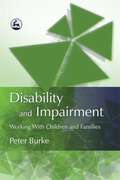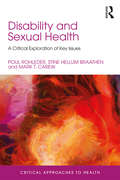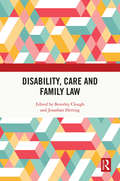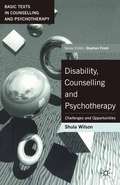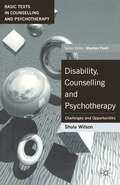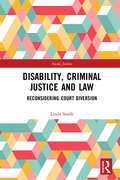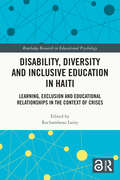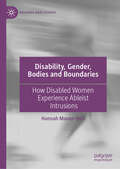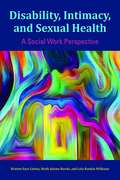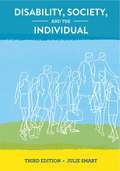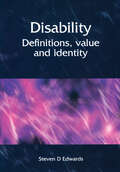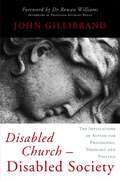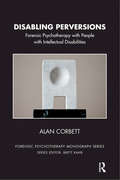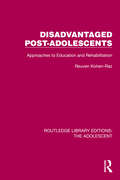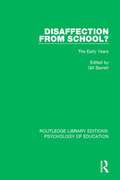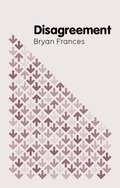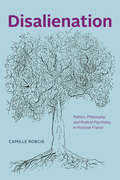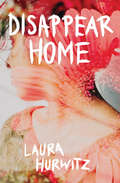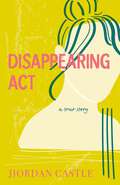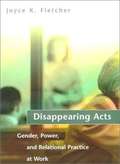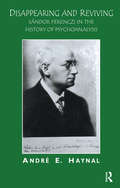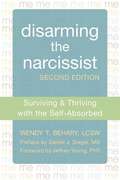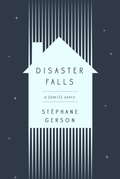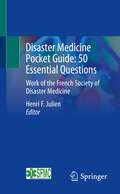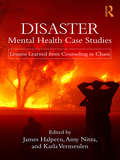- Table View
- List View
Disability and Impairment: Working with Children and Families
by Peter BurkeDisability and Impairment introduces professionals working with families to the everyday issues faced by disabled people of all ages in family life. Peter C Burke shows how social attitudes shape the world of the 'disabled family' either positively or negatively and the effects of stigma. He demonstrates the normality of disability - that children are children whatever their label - and the need for a sensitive professional understanding of the impact of both physical and learning disabilities on family members, in order to improve their quality of life. This book covers the spectrum of disability issues, and offers information and advice for professionals working with families and disability, explaining the value of family support, how to validate the feelings of siblings with disabled brothers and sisters, tackling social exclusion and understanding the role of lifelong professional help. Case studies and practice notes make this an accessible reference for social work students and practitioners.
Disability and Sexual Health: A Critical Exploration of Key Issues (Critical Approaches to Health)
by Poul Rohleder Stine Hellum Braathen Mark Thomas CarewThe sexual lives of people with disabilities are rarely discussed. It is as if, because someone has a biological or psychological impairment, they do not exist as a sexual being. As such, many people with disabilities feel marginalised and powerless not only in their day-to-day lives, but also in their ability to form sexual relationships. A range of health issues are raised as a result. Illustrated by research drawn from a range of international contexts, Disability and Sexual Health: A Critical Exploration of Key Issues is the first to examine this important but seldom acknowledged issue. Beginning with an understanding of how both disability and sexuality are socially defined phenomena, the book discusses the implications for the sexual health of people with disabilities, from sexual health education and access to information to STDs and possible sexual exploitation. The book concludes with a chapter recommending inclusive practice in line with the aims of the UN Convention on the Rights of People with Disabilities. Disability and Sexual Health will be important reading for researchers and students in health psychology, critical psychology and the psychology of sexuality, gender, disability and nursing. It will also be of interest to professionals working with people with disabilities in health care and social work.
Disability, Care and Family Law
by Jonathan Herring Beverley CloughThis book explores the series of issues that emerge at the intersection of disability, care and family law. Disability studies is an area of increasing academic interest. In addition to a subject in its own right, there has been growing concern to ensure that mainstream subjects diversify and include marginalised voices, including those of disabled people. Family law in modern times is often based on an "able-bodied autonomous norm" but can fit less well with the complexities of living with disability. In response, this book addresses a range of important and highly topical issues: whether care proceedings are used too often in cases where parents have disabilities; how the law should respond to children who care for disabled parents – and the care of older family members with disabilities. It also considers the challenges posed by the UN Convention on the Rights of Persons with Disabilities, particularly around the different institutional and state responsibilities captured in the Convention, and around decision-making for both disabled adults and children. This interdisciplinary collection – with contributors from law, criminology, sociology and social policy as well as from policy and activist backgrounds – will appeal to academic family lawyers and disability scholars as well as students interested in issues around family law, disability and care.
Disability, Counselling and Psychotherapy: Challenges and Opportunities
by Shula Wilson"What is Disability?" and "Why am I disabled?" asked Joe, the seven year old boy, born with cerebral palsy. . . Although disability is of concern to us all, very little attention has been paid to the felt experience of the disabled person and the ways in which psychotherapy might be constructively utilised. Disability, Counselling and Psychotherapy directly addresses this gap and, taking a life-span perspective and a psychoanalytic approach, actively explores the challenges and opportunities of disability to therapy, the caring professions and society more widely. Shula Wilson introduces a model aimed at achieving autonomy that is based on the significance of the primary mother-baby relationship and the awareness of human mortality. In doing so she offers a new way of relating to disabled people and working through unanswerable questions such as those raised by Joe, above. She also challenges attitudes and reactions to controversial issues such as sex, death and the mystery behind altering body image, and brings to the surface the desires, hopes and frustrations of disabled people living in an environment ridden with fears and prejudices. With its lively case discussion and clear theoretical base, Disability, Counselling and Psychotherapy is a vital resource for all practising professionals and trainees.
Disability, Counselling and Psychotherapy: Challenges and Opportunities (Basic Texts in Counselling and Psychotherapy)
by Shula Wilson"What is Disability?" and "Why am I disabled?" asked Joe, the seven year old boy, born with cerebral palsy...Although disability is of concern to us all, very little attention has been paid to the felt experience of the disabled person and the ways in which psychotherapy might be constructively utilised. Disability, Counselling and Psychotherapy directly addresses this gap and, taking a life-span perspective and a psychoanalytic approach, actively explores the challenges and opportunities of disability to therapy, the caring professions and society more widely.Shula Wilson introduces a model aimed at achieving autonomy that is based on the significance of the primary mother-baby relationship and the awareness of human mortality. In doing so she offers a new way of relating to disabled people and working through unanswerable questions such as those raised by Joe, above. She also challenges attitudes and reactions to controversial issues such as sex, death and the mystery behind altering body image, and brings to the surface the desires, hopes and frustrations of disabled people living in an environment ridden with fears and prejudices.With its lively case discussion and clear theoretical base, Disability, Counselling and Psychotherapy is a vital resource for all practising professionals and trainees.
Disability, Criminal Justice and Law: Reconsidering Court Diversion (Social Justice)
by Linda SteeleThrough theoretical and empirical examination of legal frameworks for court diversion, this book interrogates law’s complicity in the debilitation of disabled people. In a post-deinstitutionalisation era, diverting disabled people from criminal justice systems and into mental health and disability services is considered therapeutic, humane and socially just. Yet, by drawing on Foucauldian theory of biopolitics, critical legal and political theory and critical disability theory, Steele argues that court diversion continues disability oppression. It can facilitate criminalisation, control and punishment of disabled people who are not sentenced and might not even be convicted of any criminal offences. On a broader level, court diversion contributes to the longstanding phenomenon of disability-specific coercive intervention, legitimates prison incarceration and shores up the boundaries of foundational legal concepts at the core of jurisdiction, legal personhood and sovereignty. Steele shows that the United Nations Convention on the Rights of Persons with Disabilities cannot respond to the complexities of court diversion, suggesting the CRPD is of limited use in contesting carceral control and legal and settler colonial violence. The book not only offers new ways to understand relationships between disability, criminal justice and law; it also proposes theoretical and practical strategies that contribute to the development of a wider re-imagining of a more progressive and just socio-legal order. The book will be of interest to scholars and students of disability law, criminal law, medical law, socio-legal studies, disability studies, social work and criminology. It will also be of interest to disability, prisoner and social justice activists.
Disability, Diversity and Inclusive Education in Haiti: Learning, Exclusion and Educational Relationships in the Context of Crises (Routledge Research in Educational Psychology)
by Rochambeau LainyThis book examines disability, diversity, and schooling exclusion in Haiti in the wake of Hurricane Matthew. Defending a social and anthropological conception of disability as a consequence of any situation that makes a subject uncomfortable and unable to live or act properly, the book explores the difficulties that disabled children face within the school system and considers how social exclusion provokes and exacerbates educational exclusion. With contributions from linguists, educational sociologists, educational psychologists, educators, and historians, the chapters focus on a range of phenomena such as the balance of languages used for teaching, gender equity, associated disorders, and the experiences of left-handed and deaf students. Ultimately, the authors demonstrate how the educational relationships built and practiced in school influence the perceptions of people with disabilities, with respect to both singular contexts and pedagogical practices. As such, it represents an important study of the relationship between school exclusion, disability, and those with precarious socio-familial conditions, and how they can be conceptualized and addressed in the context of crises. It will appeal to scholars, researchers, and academics with interests in diversity and inclusive education, pedagogy, crisis education, and educational psychology. Chapters 1, 3, 7, and 8 of this book are available for free in PDF format as Open Access from the individual product page at www.routledge.com. They have been made available under a Creative Commons Attribution-Non Commercial-No Derivatives 4.0 license.
Disability, Gender, Bodies and Boundaries: How Disabled Women Experience Ableist Intrusions (Palgrave Hate Studies)
by Hannah Mason-BishThis book outlines the ways that disabled women experience unwanted touching and intrusive questions when navigating public space. Using the framework of feminist disability studies, this book takes an intersectional approach to fill a gap in the understanding of how disability and gender are factors in the nature and impacts of unwanted touching. It draws on research from over 70 women and non-binary people to elicit stories and examples, with some people living what some described as a ‘smaller life’. The methodology was a co-production with a disability activist. This book develops the new concept of Ableist Intrusions to investigate the nature and impacts of such experiences. It considers how non-disabled people should interact with disabled people in order to respect boundaries and bodies.
Disability, Intimacy, and Sexual Health: A Social Work Perspective
by Kristen Faye Linton Heidi Adams Rueda Lela Rankin Williams"Sexuality is a key aspect of human development and identity, yet people with disabilities frequently encounter social and political barriers to achieving healthy, autonomous intimate relationships. Society tends to associate disability with asexuality and often labels sexual behaviors among people with disabilities as problematic or deviant. Faced with these assumptions and resultant policies, how can social workers meet the needs of this diverse population across the life course? In this book, Linton, Adams Rueda, and Rankin Williams compile comprehensive research and candid interviews with social workers to explore the complicated intersection of disability and sexuality. The book begins by detailing historical violations of the sexual and reproductive rights of people with disabilities, including forced castration and sterilization. It then explores current issues of sexuality and disability throughout the life course, starting with childhood and adolescence. The authors examine the increased risk of abuse and victimization that people with disabilities face while in romantic or sexual relationships and provide practice recommendations to help combat factors that contribute to this vulnerability. Other milestones across the life course are also explored, such as pregnancy and parenting, marriage and cohabitation, and intimacy in older adulthood. Throughout the book, the authors examine the micro, meso, and macro systems that affect the lives and relationships of people with disabilities. This book touches on psychiatric, intellectual, developmental, learning, neurological, and physical disabilities and gives voice to both practitioners and their clients. It's an unflinching look at the pressing challenges professionals can face while serving people with disabilities, essential for students, academics, policymakers, and practitioners in a variety of settings who wish to advocate for the full sexual citizenship of people with disabilities"--The publisher.
Disability, Society, and the Individual
by Julie SmartThis unique book provides a comprehensive examination of the disability experience. The content focuses on definitions of disability, societal response to people with disabilities, and the experience of disability from the perspectives of individuals with disability. It is organized around broad themes rather than disability categories. With an engaging writing style and extensive and completely updated references, Disability, Society, and the Individual-Third Edition prepares the reader to understand and be able to use complex, important, and new ideas surrounding disability -- its experience and social and cultural context. The text includes discussion questions, learning activities, suggested readings, and first-person accounts. PART I--Definitions of Disability PART II--Society and Disability PART III--The Individual and Disability
Disability: Definitions, Value and Identity
by M. BonnerWhat is disability? Why terminate a pregnancy when disabling traits are diagnosed in the foetus? Can disability be part of a person’s identity? These are important questions in the current climate of increased pre-natal screening programmes designed to further reduce the numbers of children born with disabilities. This book looks at disablement from a philosophical perspective by examining these questions through a combination of critical review, discussion and narrative theory. Disability: definitions, value and identity provides practical and concise information for social care workers, counsellors, academics, students, genetics counsellors, and medical and healthcare ethicists. It will also be invaluable for disability pressure groups and policy makers.
Disabled Church - Disabled Society
by John GillibrandIn this moving and intelligent book John Gillibrand, an Anglican priest, draws on his experience of caring for his non-verbal son, Adam, who has autism and is now a teenager. He reflects on how the experience has changed not just his life, but also his whole way of thinking about theology, politics and philosophy. Illuminated by an account of his day to day experiences with Adam, and deeper reflection upon the meaning of that experience, John Gillibrand considers the challenges that autism - and disability in general - present to the western tradition of thought in theology and philosophy. His experiences lead him to consider the place of people with autism in relation to religion and philosophy, and how the difficulties in providing adequate public services for those with autism and their carers point to a need for radical transformation of western political structures. This thoughtful and incisive book will be of interest to theologians, philosophers and sociologists, as well as to all those trying to integrate people with autism into society. Parents and carers will find much to reflect on. Shortlisted for the Michael Ramsey Prize for theological writing 2013.
Disabling Perversions: Forensic Psychotherapy with People with Intellectual Disabilities (The Forensic Psychotherapy Monograph Series)
by Alan CorbettThe book offers an overview of how to work with some of the most damaged members of society - children and adults with intellectual disabilities who abuse others. Drawing on insight from two decades of clinical work, the author examines how to assess risk and danger in the forensic disability patient, ways of working therapeutically with patients at all ends of the disability spectrum, and how to support members of the patient's network. Combining psychoanalytic, creative, forensic and systemic thinking, the book provides a template for assessing, managing, containing and treating those who present with multiple diagnoses, including cognitive and physical disabilities, mutism, psychiatric disorders and autism. Both group and individual approaches are examined. As our awareness of the incidence of forensic patients who also have disabilities increases, this work is a timely placing of the forensic disability patient onto the clinical agenda, and has a wide application, being of use to clinicians in the private consulting room, the community, the secure setting and the prison.
Disadvantaged Post-Adolescents: Approaches to Education and Rehabilitation (Routledge Library Editions: The Adolescent)
by Reuven Kohen-RazOriginally published in 1983, this book elucidates the urgent problems of disadvantaged and delinquency-prone post-adolescents at the time by providing a comprehensive theoretical framework and a pragmatic outlook based on recent rehabilitation experiments. This analysis of post-adolescent psychodynamics focuses on specific issues which had previously received little attention and also deals with traditional topics such as cognitive and psychosocial development during the second decade of life.
Disaffection from School?: The Early Years (Routledge Library Editions: Psychology of Education)
by Gill BarrettOriginally published in 1989, the purpose of this book was to explore the nature and appearance of disaffection and alienation in young children and to seek to understand its significance. It deals with classroom interactions and adult expectations of children, and the context of historical and policy-related perspectives on schools as they relate to the under-8-year-olds. Theories and assumptions about these young children are re-examined, leading to questions on interpretation of behaviours, the appropriateness of practices at the classroom, teacher education and policy levels, and the societal value that was placed on the schooling experience of young children at the time.
Disagreement (Key Concepts In Philosophy)
by Bryan FrancesRegardless of who you are or how you live your life, you disagree with millions of people on an enormous number of topics from politics, religion and morality to sport, culture and art. Unless you are delusional, you are aware that a great many of the people who disagree with you are just as smart and thoughtful as you are - in fact, you know that often they are smarter and more informed. But believing someone to be cleverer or more knowledgeable about a particular topic usually won’t change your mind. Should it? This book is devoted to exploring this quandary - what should we do when we encounter disagreement, particularly when we believe someone is more of an authority on a subject than we are? The question is of enormous importance, both in the public arena and in our personal lives. Disagreement over marriages, beliefs, friendships and more causes immense personal strife. People with political power disagree about how to spend enormous amounts of money, about what laws to pass, or about wars to fight. If only we were better able to resolve our disagreements, we would probably save millions of lives and prevent millions of others from living in poverty. The first full-length text-book on this philosophical topic, Disagreement provides students with the tools they need to understand the burgeoning academic literature and its (often conflicting) perspectives. Including case studies, sample questions and chapter summaries, this engaging and accessible book is the perfect starting point for students and anyone interested in thinking about the possibilities and problems of this fundamental philosophical debate.
Disalienation: Politics, Philosophy, and Radical Psychiatry in Postwar France (Chicago Studies In Practices Of Meaning Ser.)
by Camille RobcisFrom 1940 to 1945, forty thousand patients died in French psychiatric hospitals. The Vichy regime’s “soft extermination” let patients die of cold, starvation, or lack of care. But in Saint-Alban-sur-Limagnole, a small village in central France, one psychiatric hospital attempted to resist. Hoarding food with the help of the local population, the staff not only worked to keep patients alive but began to rethink the practical and theoretical bases of psychiatric care. The movement that began at Saint-Alban came to be known as institutional psychotherapy and would go on to have a profound influence on postwar French thought. In Disalienation, Camille Robcis grapples with the historical, intellectual, and psychiatric meaning of the ethics articulated at Saint-Alban by exploring the movement’s key thinkers, including François Tosquelles, Frantz Fanon, Félix Guattari, and Michel Foucault. Anchored in the history of one hospital, Robcis's study draws on a wide geographic context—revolutionary Spain, occupied France, colonial Algeria, and beyond—and charts the movement's place within a broad political-economic landscape, from fascism to Stalinism to postwar capitalism.
Disappear Home
by Laura HurwitzIn 1970, as the hippie movement is losing its innocence, Shoshanna and her six-year-old sister, Mara, escape from Sweet Earth Farm, a declining commune, run by their tyrannical and abusive father, Adam. Their mother, Ella, takes them to San Francisco, where they meet one of her old friends, Judy, and the four of them decide to head off and try to make a life together. Finding a safe haven at the farm of kind, elderly Avery Elliot, the four of them find some measure of peace and stability. Then their mother's crippling depression returns. Confused and paranoid, Ella is convinced that she and the girls must leave before Adam finds them and exacts revenge. The girls don't wish to leave the only stable home they've ever had. But as Ella grows worse and worse, events conspire to leave them to face a choice they never could have imagined. Shoshanna has always watched over her sister and once again she has to watch over her ailing mother. Will she ever live a "normal" life?
Disappearing Act: A True Story
by Jiordan CastleMoving and evocative, Disappearing Act is a YA memoir-in-verse following author Jiordan Castle's coming of age as her family reckons with the aftershocks of her father's imprisonment.It was the summer before high school,the beginning of everything.But also an end.Jiordan’s family was never quite like everyone else’s, with her father’s mood swings, her mother’s attempts at normalcy, and her two older sisters with a different last name. But on the surface, they fit in. Until the day the FBI came knocking on the door.After that, her father’s mood plunged to a dangerous new low. After that, there was an investigation into his business and a sentencing in court. Soon Jiordan’s father would have to leave home, and her family would change forever.Reckoning with the aftershocks of her father’s incarceration, Jiordan had to navigate friends who couldn't quite understand what she was going through, along with the highs and lows of first love. Under it all was the question: If Jiordan’s father was gone, why did she feel like the one who was disappearing?Recounting her own experiences as a teenager, poet Jiordan Castle has created a searing and evocative young adult true-story-in-verse about the challenge to be free when a parent is behind bars.
Disappearing Acts: Gender, Power, and Relational Practice at Work
by Joyce K. FletcherChosen as a finalist in the George R. Terry Book Award presented by the Academy of Management for outstanding contribution to the advancement of management knowledge. With its move from hierarchical to team-based structures and its dismantling of functional barriers, the organization of the future is touted as a radical departure from traditional models. The worker of the future, we are told, must be a collaborative team player, able to give and receive help, empower others, and operate in a world of interdependence. This new worker needs relational skills and emotional intelligence--the ability to work effectively with others and understand the emotional context in which work takes place. Paradoxically, the very skills that give organizations a competitive advantage may be precisely those that prevent individual employees--especially women--from advancing. In this book Joyce K. Fletcher presents a study of female design engineers that has profound implications for attempts to change organizational culture. Her research shows that emotional intelligence and relational behavior often "get disappeared" in practice, not because they are ineffective but because they are associated with the feminine or softer side of work. Even when they are in line with stated goals, these behaviors are viewed as inappropriate to the workplace because they collide with powerful, gender-linked images of good workers and successful organizations. Fletcher describes how this collision of gender and power "disappears" the very behavior that organizations say they need and undermines the possibility of radical change. She shows why the "female advantage" does not seem to be advantaging females or organizations. Finally, she suggests ways that individuals and organizations can make visible the invisible work--and people--critical to organizational competence and transformation.
Disappearing and Reviving: Sandor Ferenczi in the History of Psychoanalysis
by Andre E. HaynalThis book is an indispensable work for anyone interested in the pioneering psychoanalyst Sandor Ferenczi. As the supervisor of the recently published correspondence between Freud and Ferenczi, Haynal brings to the present volume an elegant scholarship sensitive to Ferenczi's time and intellectual milieu. This is not solely a study in the history of psychoanalysis, in that Haynal sets himself the aim of entering into a 'dialogue' with Ferenzi, 'the founder of all relationship-based psychoanalysis and the explorer of traumatisms, counter transference and other problems present even in contemporary psychoanalysis'. Expressed in a lucid and eloquent style, each chapter explores with an intimate incisiveness, not only Ferenczi's complex and difficult relationship with Freud, but the emergence and elaboration of original ideas anticipatory of subsequent developments within the psychoanalytic movement.
Disarming the Narcissist: Surviving and Thriving With the Self-Absorbed (Second Edition)
by Daniel J. Siegel Jeffrey Young Wendy T. BeharyDo you know someone who is overly arrogant, shows an extreme lack of empathy, or exhibits an inflated sense of entitlement? Do they exploit others, or engage in magical thinking? These are all traits of narcissistic personality disorder, and when it comes to dealing with narcissists, it can be difficult to get your point across. So how do you handle the narcissistic people in your life? You might interact with them in social or professional settings, and you might even love one—so ignoring them isn’t really a practical solution. They're frustrating, and maybe even intimidating, but ultimately, you need to find a way of communicating effectively with them. Disarming the Narcissist, Second Edition, will show you how to move past the narcissist's defenses using compassionate, empathetic communication. You'll learn how narcissists view the world, how to navigate their coping styles, and why, oftentimes, it's sad and lonely being a narcissist. By learning to anticipate and avoid certain hot-button issues, you'll be able to relate to narcissists without triggering aggression. By validating some common narcissistic concerns, you'll also find out how to be heard in conversation with a narcissist. This book will help you learn to meet your own needs while side-stepping unproductive power struggles and senseless arguments with someone who is at the center of his or her own universe. This new edition also includes new chapters on dealing with narcissistic women, aggressive and abusive narcissists, strategies for safety, and the link between narcissism and sex addiction. Finally, you'll learn how to set limits with your narcissist and when it's time to draw the line on unacceptable behavior.
Disaster Falls: A Family Story
by Stephane GersonA haunting chronicle of what endures when the world we know is swept away On a day like any other, on a rafting trip down Utah’s Green River, Stéphane Gerson’s eight-year-old son, Owen, drowned in a spot known as Disaster Falls. That night, as darkness fell, Stéphane huddled in a tent with his wife, Alison, and their older son, Julian, trying to understand what seemed inconceivable. “It’s just the three of us now,” Alison said over the sounds of a light rain and, nearby, the rushing river. “We cannot do it alone. We have to stick together.”Disaster Falls chronicles the aftermath of that day and their shared determination to stay true to Alison’s resolution. At the heart of the book is an unflinching portrait of a marriage tested. Husband and wife grieve in radically different ways that threaten to isolate each of them in their post-Owen worlds. (“He feels so far,” Stéphane says when Alison shows him a selfie Owen had taken. “He feels so close,” she says.) With beautiful specificity, Stéphane shows how they resist that isolation and reconfigure their marriage from within.As Stéphane navigates his grief, the memoir expands to explore how society reacts to the death of a child. He depicts the “good death” of his father, which reveals an altogther different perspective on mortality. He excavates the history of the Green River—rife with hazards not mentioned in the rafting company’s brochures. He explores how stories can both memorialize and obscure a person’s life—and how they can rescue us.Disaster Falls is a powerful account of a life cleaved in two—raw, truthful, and unexpectedly consoling.
Disaster Medicine Pocket Guide: Work of the French Society of Disaster Medicine
by Henri F. JulienA very handy practical book written by French doctors specialised in disaster medicine, this guide offers their core experience condensed in 50 small, easily digestible chapters. Each chapter is designed to enable the reader to “know”, “understand”, and learn what to “do” in the concerned situation, ensuring the crucial information is easily on hand and available.Facing disasters, whether natural or man-made, technological or social, what are the risks and the consequences of such hazards on victims? What kind of care to provide? How to get organised, to have the appropriate resources, and to protect oneself as a responder? The French emergency and healthcare preparedness has followed a unique path. The responding medical doctors have followed in the footsteps of Dominique Larrey, a military surgeon and the father of emergency medicine. For him, the on-scene presence of doctors is paramount to organise the entire healthcare and emergency response, an innovative method that has proven its efficacy. This book is intended for all healthcare and emergency staff, doctors, paramedics or first aiders in ambulances or in emergency services who might come to deal with a massive influx of injured, poisoned, or traumatised victims. The management of multiple concomitant emergencies requires specific know-how and skills. May this guide contribute to the dissemination of a validated French know-how and thus to save lives and alleviate suffering.
Disaster Mental Health Case Studies: Lessons Learned from Counseling in Chaos
by James Halpern Karla Vermeulen Amy NitzaDisaster Mental Health Case Studies is a riveting collection of case studies by master clinicians that reveal how disaster mental health interventions must be tailored to meet the needs of survivors. Each unique case study is structured to give the reader an introduction to the community affected pre-disaster; a glimpse into the thought processes of the disaster mental health responders pre- and post-disaster; and a reflective selection of lessons learned as a result of the experiences. The 17 case studies offer the reader: Guidance on how to develop an empathic approach to disaster mental health response; Exposure to a diverse sample of disaster contexts, including naturally-occurring disasters, human-caused disasters, and disasters which occurred in an international setting; An understanding of the strategic approaches needed for disaster mental health service response, as well as an appreciation of the need for self-care when responding; A grounded and accessible writing style, bookended by chapters from the editors which thematically link and analyze the case studies. Offering a rare and compelling view into the challenges, tragedies, pain, frustrations, and grief at the heart of disaster mental health work, this must-have collection is tailored to appeal to students of mental health and counseling, psychology, and social work; and working mental health professionals who would like to learn directly from experienced responders.
